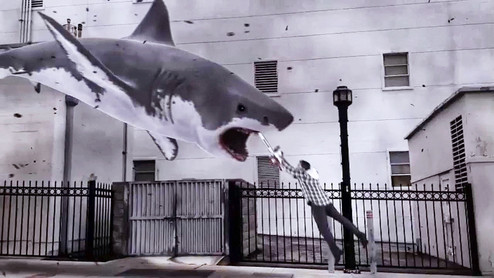The movie starts on a fishing boat that’s illegally selling shark fins, where two men are negotiating prices. They are killed off after just a few minutes of dialogue. If there’s one positive thing I have to say about Sharknado, it’s that it doesn’t pull any punches at all. It jumps right into the action and stays relatively fast paced throughout, so it covers a lot of ground in just 87 minutes. After this cold open, the movie introduces us to the main character, Fin. Clever, right? He works at a bar on the Santa Monica Pier, surfs in his free time, and sports an estranged family along with a hero complex. That’s honestly the extent of characterization we get for him. When a massive hurricane destroys the pier and threatens to flood the city, Fin and his friends, Baz and Nova, stick together to stay alive. This particular hurricane, however, brings sharks along with it. So not only is Los Angeles flooded with shark-infested waters, but waves are timed such that they fling a shark right at a person for a surprise shark attack. I have no idea how this works. Is Mother Nature working in cahoots with the sharks? Have the sharks become Waterbenders? Why are they attacking? The film doesn’t offer any explanation, but then again, they probably didn't think they needed to. This is obviously a movie that isn’t meant to take itself very seriously. The film’s tagline is “Enough Said,” and when it comes to the farfetched premise, they really stick by it. It is possible to make a good B-movie, but what makes Sharknado so special is that it’s a bad B-movie
What they really needed to spend a lot less time on is the insultingly one-dimensional characters. Fin (still pisses me off that they named him Fin) has an estranged family that he spends the movie trying to reconnect with by saving them, a la Shaun of the Dead. Fin, Baz, and Nova head over to Fin’s wife’s house to get them away from the coast, but the movie spends too much time on their problems while they hash it out in the middle of a Sharkicane—haven’t been any tornadoes yet, oddly enough. The things they discuss are so clichéd that it’s laughable, and having problems does not excuse the fact that Fin has no personality. After Fin’s wife and daughter join the party, their personal problems pop up every so often at weird times. It makes sense that they’d want to talk their problems out, but the issue here is that they barely acknowledge the deaths of other characters. Later in the movie, when Fin is reunited with his son at flight school, his flight instructor is eaten by a flying shark then almost immediately forgotten. They apparently have time to talk about how little Fin seems to care about the family, but not enough to mourn deaths.
The CGI is as fake as the actors’ emotions. It’s used for all of the big stuff you’d expect, like the waves and sharks and Sharknadoes, but it’s also used for random small things you wouldn’t expect, like a shattering window and rain drops running down a car window. The producers actually decided that CGI would do a better job than a spray bottle at making a car window wet. Hell, in one shot, they added a focus change in post to make it look like an incidental handheld shot. I get that this is a movie that isn’t meant to be taken seriously for the audience, but the people behind the camera need to care, too, and some key SFX people didn’t. It’s not nearly as bad as Birdemic’s GIFs, but it’s not even on par with old school Power Rangers. Despite these pretty substantial (and hilarious) shortcomings, it moves at a pretty satisfying clip until it climaxes with the titular Sharknadoes. They’re essentially waterspouts made with the shark-infested floodwater. They’re not that menacing (the sharks are hundreds of feet above ground level, so everyone on the ground is safe), but the movie ramps up to an insane climax that makes this movie a riot.
A common thread in the bad movies I review is that these directors bite off more than they can chew and end up having to cut corners, so things like talking cats or wide scale animal invasions end up looking amateurish and silly (more so than they already are). These films often feature bad effects, cheap production design, and insinuate that the single road the director got clearance to shoot on accounts for an entire city, like here in Sharknado. But they try, and most of the time, they fail. Sharknado failed in all the right places; the acting, effects, and script are all hilariously lousy. But the film still succeeds in its own demented, silly way because there is a goddamn Sharknado. Enough said.
This article is part of NUFEC's Bad Movies series. Find Sharknado on Netflix here and on Amazon here.

 RSS Feed
RSS Feed
